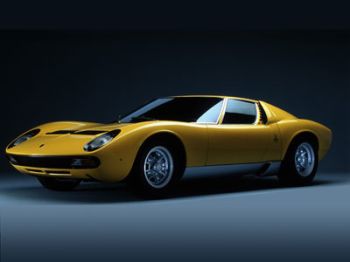|
The Lamborghini Miura, regarded by many to be the most
famous high-performance car ever to be produced in Italy, is
about to celebrate its 40th birthday.
Automobili Lamborghini will begin the official commemoration
of this anniversary at the Techno Classica 2005 in Essen,
Germany, from 7th-10th of April. The celebrations will then
continue throughout 2006 with a series of events involving
The House of Sant’Agata Bolognese, Lamborghini Clubs, and
numerous customers and enthusiasts from all over the world.
The revolutionary concept of a
supercar with a mid-engined V12
mounted transversely saw the
light of day for the first time in the autumn of 1965
at the Turin Motor Show and it cemented the reputation of
the Lamborghini name worldwide.
The chassis,
complete with all mechanical parts and therefore the
technical heart of what was to become the supercar
par excellence, was presented to the public in
Turin.With this chassis, its creators, the engineers
Gianpaolo Stanzani and Gianpaolo Dallara, turned the
accepted concept of a super sports car on its head.
The ‘TP400’ chassis, the abbreviation stands for
‘Trasversale Posteriore 4.0 litre’, was constructed from
sheet steel which was bent, cut, welded and drilled in a
more aeronautical rather than automotive style. This was a
radical innovation compared to the standard solution of a
circular or oval section tubular chassis.
|
 |
|
Lamborghini Miura 40th anniversary official logo |
|
 |
|
|
 |
|
The Lamborghini Miura, is regarded by many as the most
famous high-performance car ever to be produced in Italy |
|
|
This intricate structure in sheet steel provided the frame
for the vehicle, the attachment points for the suspension,
the central area for the cockpit and the
space for the drivetrain, which
was just as revolutionary.
The well-known, highly-rated V12
engine from Bologna, which had a cylinder capacity of
3,929cc and a maximum power of 350 hp, was modified by
creating a new engine block into which the clutch,
transmission and
differential were incorporated.
This single, light-alloy sculpture made sure that the
principal mechanical parts of the TP400 were integrated into
a unique, light, rigid and compact structure: ideal for use
in a very high performance sports car.
The fact that the engine and transmission unit was mounted
immediately behind the cockpit and in front of the rear
wheels, and therefore near the centre of gravity of the car,
meant that weight distribution and the polar moment of
inertia were particularly good. |
|
![]()
![]()